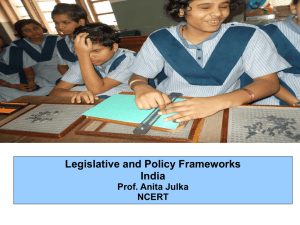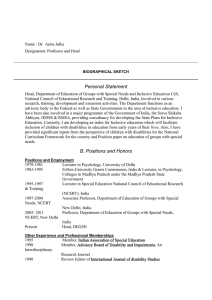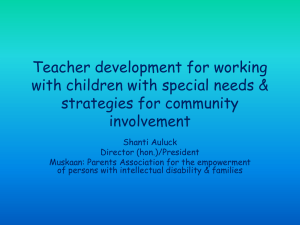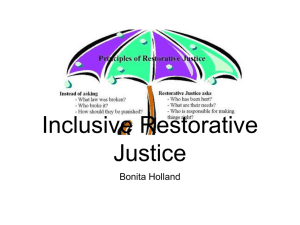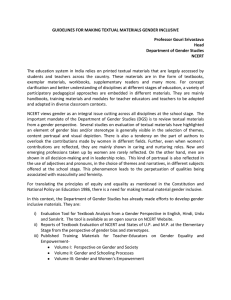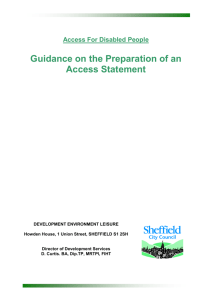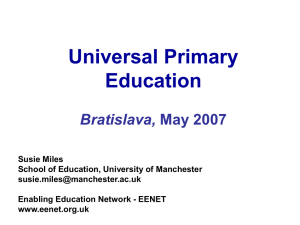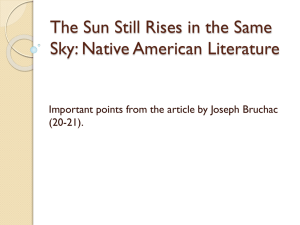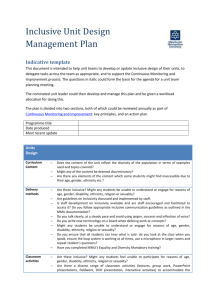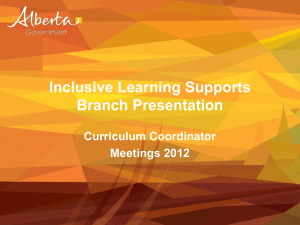PPT - Teacher Education
advertisement
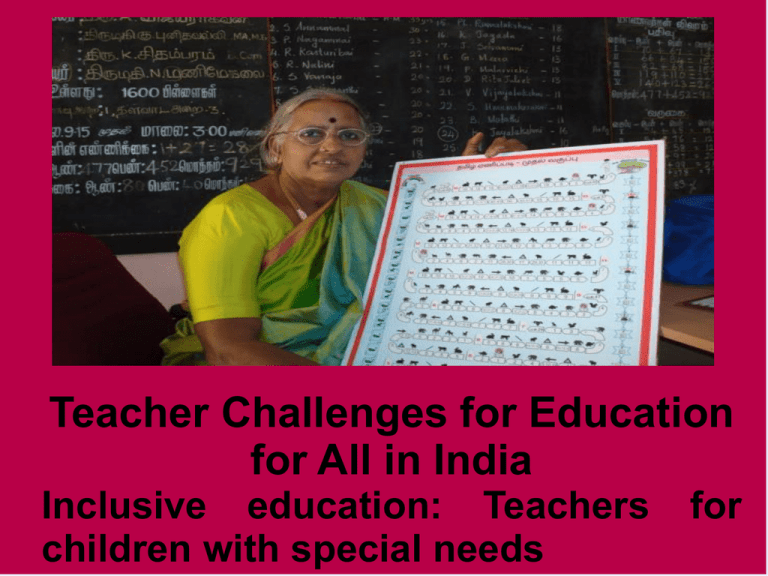
Teacher Challenges for Education for All in India Inclusive education: Teachers children with special needs for The Presentation INCLUSION AND PARADIGM SHIFTS EXISTING POLICY, CONSTITUTIONAL AND LEGISLATIVE FRAMEWORKS PRE-SERVICE AND IN-SERVICE PROGRAMMES OF NCERT CHALLENGES AND ISSUES Inclusive Education is a a process of increasing the participation of all students in school, including those with disabilities Social exclusion Congregation & segregation into institutions Community Living Movement-1970s. valued, contributing citizens of their communities-1990s Constitutional and Legal Obligations CWSN to be taught by a trained teacher Rehabilitation Council of India Act, 1992 Educate CWSN in an appropriate environment till 18 years Persons With Disabilities Act, 1995 Free and compulsory education to children, upto 14 years Right to Education Act, 2009 Law, policy, programmes and rights instruments reflect two primary approaches or discourses that treat disability either as an individual pathology or as a social pathology. NATIONAL FRAMEWORKS Teachers must be trained to address the learning needs of all children including those who are marginalized and disabled NCF, 2005 Teacher Education Institutions will need to reframe their programme courses to include the perspective, concept and strategies of inclusive education NCFTE, 2009 Gearing all teacher education programmes to developing pedagogical skills required in inclusive classrooms- National Focus Group-2005 Special teachers fully included Recognizing Diversity Not failing any students Class Teacher responsible for all children Developing strengths & abilities NCERT Making Curr. Inclusive & Accessible Promoting self reliance & inculcating critical thinking, decision making, problem solving etc. Nurturing all aspects of personally Policy Initiatives INTEGRATED EDUCATION FOR THE DISABLED (IEDC)-1974,1992 Five days orientation programme for general teachers and three days for administrators PROJECT INTEGRATED EDUCATION FOR THE DISABLED (PIED)- NCERT, 1987 Entire General Education System mobilized in ten Blocks All general teachers in the block given 2 &5 days training for identifying with a check list in school and out of school & FORFunctional assessment Out of these 30-60 given six weeks intensive training 1 year multi category diploma in Regional Institutes of Education TRAINING COURSES AT NCERT PRE SERVICE COURSES AT RIEs Inputs on children with special needs, Inclusive Education in B.Ed (Bhopal, Ajmer) Inputs in M.Ed (Mysore, Bhubaneshwar, Bhopal and Ajmer) SPECIFIC IN SERVICE TRAINING PROGRAMMES Capacity building of teacher educators through EDUSAT Training of primary school teachers on assessment & remediation of learning problems in students with ADHD Preparation of the guidelines, manuals, modules Training in action research for educational interventions Development of pool of resources in RIEs SARVA SHIKSHA ABHIYAN TRAINING (3-5 DAYS, 90 days) Training of resource teachers across disability Training of Care Givers for Home Based Education Training of General Teachers, Aanganwadi workers, parents, Head masters etc TRAINERS Experts in SRGs and DRGs,BRCC/CRC, SCERT and DIET Faculty, CBR, HBE/School Readiness and IE, Faculty from National/Regional Institutes, DDRC/CRC and University, NGOs/ Special schools/ Teachers or Persons with Disability and Parents, TTCs for Spl. Education, Resource Teachers,Therapists, Rehab and Medical experts. TRAINING MATERIALS INCLUSIVE EDUCATION OF THE DISABLED AT SECONDARY STAGE Training of Special and General Teachers Special Teachers trained by RCI run programmes -National Institute, Universities All general teachers at the secondary level trained in particular strategies like making assessments, planning an individualized curriculum, teaching styles which include audiovisual aids, appropriate instructional strategies, etc. TRAINERS In association with resource institutions like NCERT,SCERTS, NIOS, State Open Schools, RCI, IGNOU and teacher training institutions like IASEs, CTEs, University etc. ISSUES AND CHALLENGES Vision and values in schools NOT based on inclusive ethos A ' will have to do' rather than 'will do' or 'can do' attitude Short term introductory training only awareness creating Long term training (90 days) fails to build the skills for inclusive classrooms Pro-active approach to identifying barriers and finding practical solutions missing Partnerships with parents, community and other staff members need to be strengthened Strong leadership & regular critical review and evaluation necessary Lack of Resource Persons for Training Teachers Practical Training not inclusive Teacher Education Programmes at pre-primary and primary level to be more inclusive Children with HIV AIDS Discriminatory attitudes and stigmatization and no significant role of teachers in child protection and promotion of safe and healthy environments 24 lakhs living with HIV AIDS out of which 3.5% are children below 15 years and carry scars on their lives (NACO) Many turned away from schools Many drop out Mangal Lakhapati (2006) is one of the 121 teachers for helping students to shape their ideas and attitudes on issues underlying HIV/AIDS. Sensitivity to needs stemming out of impairment, social disadvantages and other difficult circumstances- scheduled tribes, scheduled castes, slum children, working children need to be inculcated No inputs for gifted children Satyam Kumar of Bakhorapur village in Bhojpur district qualified for IIT from the Mumbai zone with an all-India rank of 8,137. For father, Sidhnath Singh, a farmer, "It is a matter of pride that my son is the youngest toqualify ." IF TEACHERS WERE AWARE SATYAM WOULD NOT HAVE NEEDED TO PROVE HIMSELF TEACHERS' VOICES We do not have the time to explain each and every concept, we need to have support of a special educator Since these children do not have less IQ, hence they can fit into the existing classroom processes l Factors like large Classroom sizes, maintaining discipline, vast syllabus, emphasis on Marks, only few included students act as constraints They like Science. But they simply cannot sit inside a classroom to learn it. So we started taking classes in the open where they are at ease CONCLUSION The principle of respect for differences and acceptance of disability as part of human diversity and humanity is important as disability is a universal feature of the human condition. Also. differences in children, such as age, gender, ethnicity, language, HIV should be acknowledged and respected The problem is not how to wipe out the differences but how to unite with the differences intact Rabinder Nath Tagore I am SPECIAL, does that means I am better than others or worse than others?

